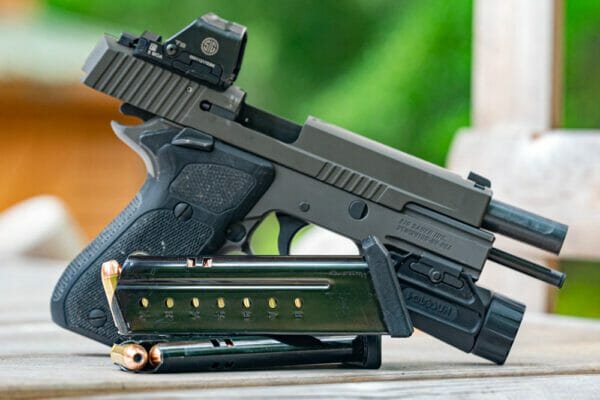
Never underestimate the ability of certain Members of Congress to waste taxpayer dollars and time on proposed legislation that is either already being done or will do nothing to improve community safety.
Burning tax dollars for press releases gives Congress the appearance of “doing something,” but the reality is that some ideas are just plain dumb.
Take for example U.S. Rep. Rashida Tlaib’s (D-Mich.) Safe Storage Saves Lives Act, H.R. 4201, that would require “firearm retailer[s] have a compatible gun lock available for every firearm for sale” and states that it “shall be unlawful for any person to offer a firearm for sale unless the person offers for sale a secure gun storage or safety device that is compatible with the firearm,” according to a Fox News report.
This is a solution in search of a problem because this is already being done by the firearm industry. Every firearm shipped from the factory includes a free locking device in the box. The firearm industry has been doing this for more than two decades. NSSF took it a step further, however, and has been administering the Project ChildSafe program. That’s a partnership with 15,000 law enforcement agencies in all 50 states and five U.S. territories to give away free firearm safety kits that include a locking device in the package, along with firearm safety material.
The firearm industry wants all firearms that are not in use to be properly secured when not in use and inaccessible to those who cannot be trusted to possess them without supervision. That includes children, prohibited individuals, and those who might be suffering through a mental health crisis or suicidal ideations. The firearm industry has been working on this effort for over 20 years, which has been funded by the firearm industry along with periodic federal and state grants.
Between Project ChildSafe and the firearm manufacturers providing locks, more than 100 million have been distributed. If anyone wants a free lock, they’re available by contacting their local police department, which will provide them free of charge and with no questions asked.
Ditch NICS?
It doesn’t end there, though. Under the category of “it is already being done,” Rep. Madeleine Dean (D-Pa.) introduced legislation to undermine the FBI’s National Instant Criminal Background Check System (NICS). That’s the nationwide federal system that allows firearm retailers to know instantly if an individual is prohibited from possessing a firearm. NSSF has been working since 2013 to FixNICS to improve record submissions to ensure all disqualifying criminal and adjudicated mental health records are submitted to the FBI.
Some states use their own background check systems. Those states are called point-of-contact states. There are thirteen states, including Rep. Dean’s Pennsylvania, that run their own background checks on firearm purchases. Rep. Dean wants more money for more states to opt out and create a patchwork of state systems with H.R. 4159, to establish a grant program through the Department of Justice (DOJ) to incentivize states to establish point-of-contact systems for firearm sales subject to a background check.
Rep. Dean wants to use federal tax dollars to have state agencies do what a federal agency already does. The point-of-contact states that run their own background checks electronically access the FBI’s NICS. The proposal would create duplicative and costly systems that would only waste taxpayer dollars and create potential delays in the ability of law-abiding citizens to exercise their Second Amendment rights when they legally purchase a firearm.
Retailer Burdens
Not to be outdone, Rep. Mike Quigley (D-Ill.) re-introduced H.R. 3824, the Trafficking Reduction and Criminal Enforcement (TRACE) Act, to prevent the illegal sale of firearms. The Gun Control Act, signed into law in 1968, already makes it a felony to sell a firearm to anyone who cannot pass a background check. To be fair, Rep. Quigley’s legislation doesn’t do any of that. It would only put more requirements on firearm retailers and the firearm industry but doesn’t address the criminals illegally-obtaining or criminally misusing firearms.
His bill would require the FBI NICS to maintain an electronic record of every firearm transfer for 180 days instead of the 24-hour requirement that the transfer record be purged from the system. It would also require firearm retailers to report lost or stolen firearms. That’s already a requirement under the Bureau of Alcohol, Tobacco, Firearms and Explosives (ATF) and federal law. Firearm retailers are required to report lost or stolen firearms within 48 hours of discovery to ATF and to the local law enforcement agency.
The firearm industry has been active on that front too. NSSF partners with DOJ and ATF for Operation Secure Store to raise awareness among retailers and encourage enhancements to security. As part of this effort, when a firearm is stolen from a retailer, NSSF matches ATF rewards to recover the firearm and bring the criminals to justice. NSSF worked with Rep. John Rutherford (R-Fla.) and U.S. Sen. Lindsey Graham (R-S.C.) to re-introduce the Federal Firearms Licensee Protection Act to increase criminal penalties for criminals burglarizing or robbing firearm retailers. Congress should pass this bipartisan legislation that is supported by every major law enforcement group in the country.
Unfortunately, Rep. Quigley has yet to support that legislation but opts instead to layer requirements on firearm retailers and require firearm manufacturers to include secret serial numbers visible only under infrared light hidden within a firearm and nullify the Tiahrt Amendment by opening up incomplete firearm trace data for public access that would put criminal investigations and law enforcement safety at risk.
Watchlists, Serialized Ammo & More Taxes
Rep. Norma Torres (D-Calif.) re-introduced H.R. 4202, Multiple Firearm Sales Reporting Modernization Act, which would require firearm retailers to report the sale of two or more long guns, including semi-automatic rifles such as AR-15s and AK-47s, to an individual within a five-day period. Since AR-15s – or Modern Sporting Rifles (MSRs) are the most-popular selling centerfire rifles in America, and the legislation would require a report on sales of two or more of all firearms.
To be clear, this would be a report of any individual that’s already passed a background check to purchase a long gun legally. Rep. Torres’ bill wouldn’t provide actionable intelligence for law enforcement to hold criminals accountable. It would only add mountains of needles to the haystacks that investigators must sort through. It would also set a troubling precedent of creating government watchlists for individuals lawfully exercising their fundamental Constitutional rights.
Rep. Danny Davis (D-Ill.) might have the most outlandish notions, though. He introduced H.R. 4330, legislation to require serial numbers to be engraved on ammunition. That would turn the production of ammunition from a day-long process to one that would potentially take a month. That would also considerably increase the cost of ammunition as the technology required to make this possible and the record-keeping overhead would be passed along to the customer. Cartridge serialization ideas already failed in California and New York because it was impossible to implement.
Rep. Davis doesn’t stop there. He also introduced, H.R. 4283, the Gun Violence Prevention and Safe Communities Act. That bill would increase the federal excise tax on firearms and ammunition and add a new tax on MSR frames and receivers to fund federal gun control grants. The firearm and ammunition industry already pays a 10 and 11 percent excise tax that funds wildlife conservation. This new tax, though, would direct an estimated $20 to $36 million in new taxes that would be added to the costs shouldered by law-abiding gun purchasers but doesn’t do anything to hold criminals accountable for their crimes.
There are better things to do with taxpayer dollars and time. Introducing do-nothing bills is the antithesis of “doing something.” These Members of Congress should be focused on holding criminals accountable instead of chasing headlines.
About The National Shooting Sports Foundation
NSSF is the trade association for the firearm industry. Its mission is to promote, protect and preserve hunting and shooting sports. Formed in 1961, NSSF has a membership of thousands of manufacturers, distributors, firearm retailers, shooting ranges, sportsmen’s organizations, and publishers nationwide. For more information, visit nssf.org

